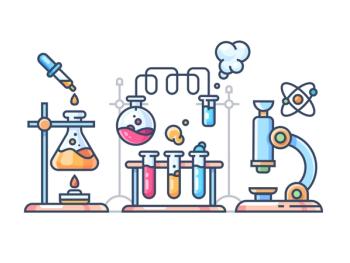
A harmonization of all conventional hold-up volume methods was successfully applied to RPLC, HILIC, AEX, and RP-AEX mixed-mode chromatography, regardless of the mobile phase.

A harmonization of all conventional hold-up volume methods was successfully applied to RPLC, HILIC, AEX, and RP-AEX mixed-mode chromatography, regardless of the mobile phase.
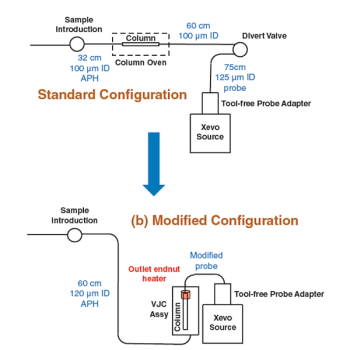
An UHPLC–MS research prototype instrument was built to improve the resolution power and the usability of conventional LC–MS hyphenated instruments for routine analyses in pharmaceutical applications.

With a new prototype, we explore how to improve the resolution power and usability of LC–MS instruments for routine analysis in pharmaceutical applications.

A gradient twin-column recycling liquid chromatography (GTCRLC) process has been developed and applied for the isolation of a single polycyclic aromatic hydrocarbon (PAH), chrysene, present in a complex PAH mixture.
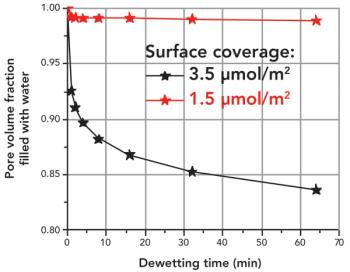
We investigate a phenomenon observed by many practitioners of reversed- phase LC: a dramatic loss in retention volume or time after the column flow is stopped and resumed when using highly aqueous mobile phases with certain columns.

At the 43rd International Symposium on Capillary Chromatography (ISCC 2019) in Fort Worth, Texas, a panel addressed the current challenges and potential future directions in capillary liquid chromatography. How can their vision be achieved?

The “State-of-the-Art in Capillary Liquid Chromatography” panel discussion at the 43rd International Symposium on Capillary Chromatography (ISCC 2019) in Fort Worth, Texas, USA, was a thoughtful dialogue on current challenges and potential future directions in the field. The session included a general overview of the current state of the field, key drawbacks preventing widespread use of capillary liquid chromatography (LC) columns, and how these challenges might be overcome. In this article, we highlight some of the common themes that were discussed as part of this panel.

This article demonstrates how a user-friendly vacuum-jacketed column (VJC) has been designed without the need of a large internal diameter vacuum chamber and low- and high-vacuum pumps.
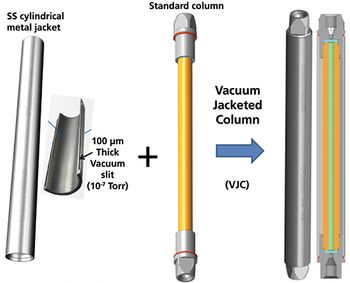
The design of a user-friendly vacuum-jacketed column (VJC) is described for improved LC–MS performance, which does not require a large vacuum chamber with multiple vacuum pumps. Using this configuration, the experimental peak capacities measured for a 2.1 mm × 100 mm column packed with sub-2-μm particles and placed in the VJC-MS probe are doubled with respect to standard LC–MS systems.

Thermal effects in UHPLC and low-density SFC cause peak broadening and distortion. A solution to this problem is to thermally insulate the chromatographic column. Vacuum-jacketed column technology has been developed as a new approach to insulate the column in a practical way.

Despite the theoretical promise of reduced plate heights (h) < 1, most modern UHPLC columns can only deliver plate heights in the range from 1.4 to 2.5. However, improved packing procedures, a better understanding of the colloidal properties of particle suspensions, and the study of the rheological behavior of packed beds and the final bed structure should lead us to practical solutions that can double the column efficiencies.

In this extended special feature to celebrate the 30th anniversary edition of LCGC Europe, leading figures from the separation science community explore contemporary trends in separation science and identify possible future developments. We asked key opinion leaders in the field to discuss the current state of the art in liquid chromatography column technology, gas chromatography, sample preparation, and liquid chromatography instruments. They also describe the latest practical developments in supercritical fluid chromatography, 3D printing, capillary electrophoresis, data handling, comprehensive two‑dimensional liquid chromatography, and multidimensional gas chromatography.

When Professor Georges Guiochon passed away last October, at the age of 83, the separation science community mourned the loss of one of the great pioneers of the field.

This article reports on the physical phenomena that control column efficiency and on experimental protocols designed to accurately measure their contributions to band broadening of analytes during their passage from the injection to the detection device. The results of these protocols are analyzed, allowing for the accurate determination of the complete mass transfer mechanism in different separation modes and providing solutions and future directions to further improve the efficiency of liquid chromatography columns.

Professor Georges Guiochon spoke to Fabrice Gritti about his pioneering contributions to the field of separation science.

Detailed study results challenge common beliefs about the mechanisms behind the excellent performance of core–shell particles.

Published: November 1st 2021 | Updated:
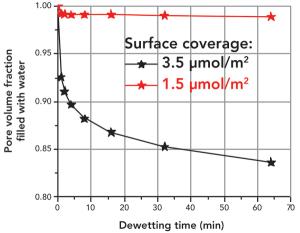
Published: January 1st 2021 | Updated:

Published: July 1st 2022 | Updated:

Published: January 1st 2023 | Updated:
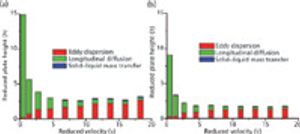
Published: July 1st 2012 | Updated:

Published: February 1st 2014 | Updated: